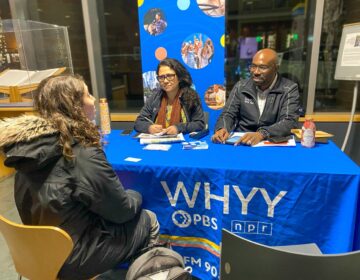Overdoses from counterfeit fentanyl is a growing problem in New Jersey

A memorial wall in Minneapolis in May for the artist Prince
The growing presence of the drug fentanyl – and its “counterfeit” clones — has driven up the number of overdose deaths in New Jersey and secured the state a spot in the top five nationwide when it comes to police seizures of the powerful synthetic opioid.
But leaders in Trenton are seeking to curb this dangerous trend.
Gov. Chris Christie said the state had issued an emergency order to ensure that those caught with any of seven “knock-off” versions of fentanyl are subject to the same criminal penalties as if they had the real drug, one of several efforts he announced Tuesday to combat addiction. The order makes it a third-degree crime to manufacture, distribute, or possess any of the seven chemical compounds, punishable by a fine up to $25,000 and three to five years in prison. Sen. Diane Allen (R-Burlington) later said she would introduce legislation to make the change permanent.
Christie’s announcement, timed to coincide with National Recovery Month, came a day after a New Jersey Senate health committee approved a proposal to increase fentanyl penalties to align with those for cocaine and heroin. Sponsored by Sen. James Holzapfel (R-Ocean) — who represents an area that has become an epicenter for heroin, and now fentanyl, use – the measure calls for those caught with fentanyl to be charged with a first-degree crime, face a $500,000 fine, and 10 to 20 years behind bars.
Advocates for drug users and their families have largely supported the governor’s investments in intervention and treatment programs, but the push to increase penalties has drawn a sharp rebuke from many of the same supporters. Nearly three-dozen groups — under the name New Solutions Campaign — signed a letter urging the Senate health committee not to vote on Holzapfel’s bill, which they said would do little to reduce drug use or addiction, while only adding to the state’s already overburdened prison system.
“We have spent the last 30 years increasing penalties for drug offenses and this has had no impact on drug use or abuse. Increased penalties are not the answer. We need more treatment beds, not more prison beds,” wrote New Solutions, which is focused on “fair and effective” criminal justice.
However, Christie said the fentanyl clone order, issued by the office of the attorney general, is an important tool in fighting the battle against addiction, and makes New Jersey one of the first to take this step. While addiction impacts millions of Americans, the Garden State has been particularly hard hit by the opioid crisis. State statistics show at least 28,000 drug users sought treatment in recent years and hundreds are killed by addiction annually.
Fentanyl also appears to be having an outsized impact on the Garden State, according to an advisory issued last fall by the Centers for Disease Control and Prevention. While the drug is available by prescription to aid cancer patients and those with chronic pain, it is 50 to 100 times more powerful than morphine.
Now also synthesized by criminals, in labs similar to those used for meth, fentanyl has been cut with, or substituted for heroin, causing a growing number of deaths in unsuspecting addicts. In Ocean County, the drug has been linked to more than 200 deaths in the past three years, reports show; the governor said 150 people have been killed statewide by the drug this year alone.
“Today with these added initiatives we’re taking our fight against opioid addiction and the destruction it brings to a new level,” Christie said at an event in his Trenton office, joined by former Gov. Jim McGreevey, a Democrat who has championed treatment issues for those emerging from prison, and collaborated with the Republican governor on a number of programs.
“We need to continue to push here in New Jersey for more availability of treatment for a greater understanding of this issue,” Christie added, pledging to continue his work to help those battling addiction. “In the end we still have an enormous problem with stigma in this state. People are afraid to come forward and admit that they have this problem. It’s a disease.”
Christie also used the opportunity to announce the expansion of the state’s Recovery Coach Program, which pairs trained addicts in recovery with overdose victims to help them negotiate their options and, perhaps, connect with treatment. Those involved have said the pilot program showed extraordinary success in Camden, Essex, Monmouth, Ocean, and Passaic counties. The governor seeks to extend this work to Atlantic, Bergen, Burlington, Hudson, Gloucester, and Middlesex counties as well.
In August Christie signed a bill that allowed for the expansion of needle-exchange programs in New Jersey communities and pledged $200,000 in state funds to shore up five struggling efforts already operating in Atlantic City, Camden, Jersey City, Newark, and Paterson. State reports show these programs have helped thousands of intravenous drug users get access to clean syringes, reducing the tendency to share needles and helping to drive down the HIV rate.
These initiatives have generally been supported by many of the members of the New Solutions Campaign, including the Hyacinth AIDS Foundation, ACLU and Drug Policy Alliance, which spearheads the effort. Many have been longtime advocates for the needle-exchange program and were thrilled when the governor approved the funding this summer.
But the call for increased penalties is a different story, especially when it comes to the Holzapfel bill (S-1026), which passed the committee without support from its chairman, Sen. Joseph Vitale (D-Middlesex) or Sen. Jim Whelan (D-Atlantic.) The bill would require stiffer penalties for those caught with five ounces or more of the substance; possession of less than half an ounce would involve a fine of $75,000, but not necessarily prison time.
The measure was eagerly embraced by the others, including Sen. Ron Rice (D-Essex), a longtime advocate for drug policy reform who opposes needle exchange. “I think we need to start taking a look at penalties,” Rice said, noting that “prison might make sense” for some of those involved with the manufacture and sale of fentanyl.
Other lawmakers motivated by the deadly nature of this particular opioid, which has triggered breathing problems and other reactions in some police officers during drug raids. Two officers in Atlantic County were among the first to report this concern, in 2015, and became part of a video message on the dangers of fentanyl, produced by the national Drug Enforcement Administration.
“This is not a small, recreational drug — this is a killing drug,” Allen said at the hearing. Her proposal would codify Christie’s emergency order to boost the penalties for fentanyl clones and enable the expansion of the Recovery Coach program, which is coordinated by RWJ Barnabas.
___________________________________________
NJ Spotlight, an independent online news service on issues critical to New Jersey, makes its in-depth reporting available to NewsWorks.
WHYY is your source for fact-based, in-depth journalism and information. As a nonprofit organization, we rely on financial support from readers like you. Please give today.




